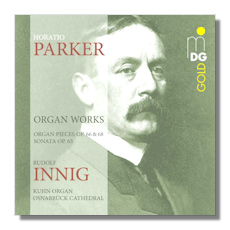
The Internet's Premier Classical Music Source
Related Links
- Parker Reviews
- Latest Reviews
- More Reviews
-
By Composer
-
Collections
DVD & Blu-ray
Books
Concert Reviews
Articles/Interviews
Software
Audio
Search Amazon
Recommended Links
Site News
 CD Review
CD Review
Horatio Parker

Organ Works
- Organ Sonata in E Flat Major, Op. 65
- 4 Organ Pieces, Op. 66
- 5 Organ Pieces, Op. 68
Rudolf Innig, organ
Dabringhaus & Grimm MDG3171741-2 65min
Born in Auburndale, Massachusetts on 15th September 1863, Horatio Parker was one of some five thousand young Americans who came to Germany during the second half of the 19th century to study music. Parker was not a child prodigy, and his enormous talent was discovered only when he was a lad of 14. One of his most prominent teachers at this stage was George Chadwick, with whom he studied in Boston. On his recommendation, Parker's parents sent their son to Munich in 1882 to study with Josef Rheinberger, a famous organist and composer. Parker's outstanding talent so impressed his teacher that he was entrusted with the soloist's part in the premiere of his First Organ Concerto in F Major, Op. 137 in 1884. On his return to the States, he was appointed to the faculty of Yale University, a post he held for 26 years, and during this eminent career he was the recipient of many prestigious positions. During these years his reputation as a teacher was unparalleled, and many great American composers of his time, such as Charles Ives and Roger Sessions, all benefited from his teaching acumen.
Rheinberger always emphasized the importance of expressing oneself in as many genres as possible, and this Parker did. Indeed his output includes chamber works, symphonic music, cantatas, oratorios and even operas, but somehow his name will always be connected to the organ and piano pieces that he wrote. This CD highlights three such works. Composed between 1908 and 1910, these organ works are the fruit of Parker's maturity and all bear a different signature from the pieces he wrote some 20 years earlier. By this time his language was characterized by artistic polyphony, cantabile melodies and colourful harmonies as well as his innate feeling for form.
The Sonata, Op. 65 in particular, is regarded as one of the masterpieces of the late romantic organ literature, and is in every way a match for the great sonatas of his teacher Rheinberger. The 4 Organ Pieces, Op. 66 are a conglomeration of four concert pieces of virtuoso character brought together to form a suite, while the Five Organ Pieces, Op. 68 represent a very different dimension. They are all of a short duration and have either poetic or musicological titles allotted to each one. Mostly in three-part form, they might be termed Parker's "Kinderszenen" for Organ; miniatures of the highest order and precise expression.
Rudolf Innig performs this rare organ repertoire with authoritative brilliance, and his insightful readings betray an architectural coherence that keeps the listener's heart and mind engaged throughout. This is a sensitively and perceptively executed programme, complimented by some fine annotations and state-of-the-art sonics.
Copyright © 2012 by Gerald Fenech.





















